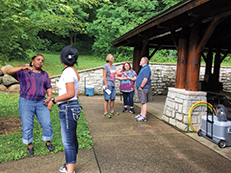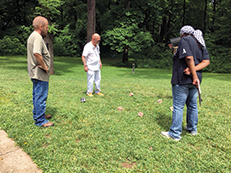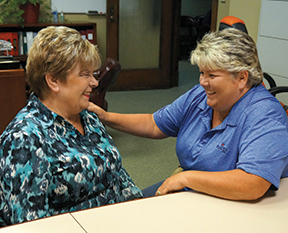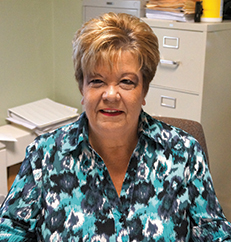

Summer Fun at Annual Picnic
PLACES held its annual summer picnic for residents, clients, tenants and staff on June 15 at Hills & Dales Paw-Paw Shelter. Attendees enjoyed a DJ for music and games arranged by the Supportive Living Program staff. A fun time was shared by all.

.jpg)

Voices Statewide Weigh In On Critical Topic
“What is Ohio’s Behavioral Health Redesign? A transformative initiative aimed at rebuilding Ohio’s community behavioral health system capacity. Key proposals include adding new services for people with high intensity service and support needs and aligning the procedure codes used by Ohio’s behavioral health providers to better integrate physical and behavioral healthcare.”
– bh.medicaid.ohio.gov website
“Almost everyone in the behavioral health community agrees: Ohio should redesign its coding for services and billing so that it aligns with national standards. The change will expand access to treatment and care, thus benefiting those with mental illness and addictions.”
– Editorial Board of the Akron Beacon/Journal, May 20, 2017
“Since the concept of Behavioral Health Redesign emerged, NAMI Ohio has been a strong, if not the strongest, supporter of the intent of redesign. NAMI Ohio is supportive of the efforts to integrate behavioral health with physical health, and to focus on better outcomes for the people that we represent. We believe the process has been transparent and everyone has had significant input.”
– Terry L. Russell, Executive Director, NAMI (National Alliance on Mental Illness) Ohio
Long-time Board Member Honored

Zerella Roberts received a plaque on July 24 from board president William Schuerman, Ph.D., for her 25 years of service and dedication to PLACES.
“It is impossible to estimate the countless hours that Zerella has volunteered her time to PLACES,” said executive director Roy Craig. “In her 25 year tenure PLACES has grown and improved its services, and she has played an important leadership role in that growth.”
Ms. Roberts first became involved with PLACES as a volunteer with Clients for Better Care, a mutual support group of Day-Mont Behavioral Health Care patients.
Sharing practical ideas to solve problems is how Zerella and other volunteers pay it forward. “PLACES has helped me a lot,” she said. “I still go to Day-Mont West. I’m happy if I can help somebody else.”
It Takes Lifelong Learning

In the rapidly evolving world of healthcare, employees need to be lifelong learners. That means pushing out of one’s comfort zone. Stacy Graham told a story of how Roy was struggling to recruit the right human resources person when he took a chance on her.
“Roy had been through three HR people, maybe four. He found someone who knew HR, but didn’t understand the people we serve or the kind of people we needed to hire. That led him to take a different approach: hire someone who knew the folks and teach them HR,” she explained. “This job gave me an opportunity for more money, to get into the corporate world and learn a whole new skill set.” It was the scariest decision she ever made, but one she’d make again in a heartbeat.
“Roy pushed me to be certified; that’s when I first felt confident,” she added. “He brought it up every review time for a few years until I finally decided to go for it.” After spending every Saturday at Wright State University for six months and sitting for a difficult exam, Stacy now has not one, but two certifications: PHR and SHRM-CP.
Keeping Safe in Summer
Proper attire and hydration reduce risk.

Did you know that people diagnosed with mental illness or substance abuse problems can be at higher risk during the summer?
Psychotropic medications make people especially sensitive to heat. If you have loved ones in this condition, it’s good to know that PLACES takes extra care to make sure residents are properly attired and hydrated for the day’s activities. All staff at PLACES group homes are trained to help residents pick the right clothing for a particular day’s weather forecast and what they’ll be doing, whether indoors or outside.
PLACES also makes sure that everyone in its Supportive Living and Opening Doors programs has access to air conditioning or a fan. Case managers help tenants and clients choose the proper attire to avoid heatstroke. Heat can be a particular problem for substance abusers, too, as alcohol use leads to dehydration.
“We keep an extra eye on substance abusers, since heat adds to the severity of a situation,” said Director of Client Services Janet Johnston. “We practice a harm reduction model. This means that while we employ techniques such as motivational interviewing to move people towards recovery, if they are going to use, we want them to do it in the safest environment possible, not in a building unfit for habitation or on the street.”
Johnston also said that PLACES makes tenants and clients aware of emergency heat shelters through their case managers during periods of extremely high temperatures.
Behavioral Health Redesign is Coming
Ohio Strives To Bring Medicaid Billing In Alignment with National Standards, Enabling New Services

The administration of Governor John Kasich undertook an initiative during state fiscal year 2016/17 to rebuild the capacity of Ohio’s behavioral health system and modernize our state’s Medicaid program. In 2016, Ohio spent nearly a billion dollars on drug and alcohol treatment services. Montgomery County is especially hard hit, with easy access to the flow of illegal substances on interstate highways. There were 160 overdoses in the first quarter of 2017, and the county is on pace to exceed last year’s 355 conclusive or suspected deaths from overdose, according to an article published in the Dayton Daily News in March.
With the goal of improving health outcomes for Ohio citizens diagnosed with mental illness and/or substance abuse while staying accountable to taxpayers, Behavioral Health Redesign seeks to develop new services for those with intensive needs and bring the coding of Medicaid services in Ohio into alignment with national standards.
Originally scheduled to launch July 1, new Ohio Medicaid benefits have been delayed a bit as providers prepare themselves for the change. “Behavioral Health Redesign is still in the developmental stage,” said Director of Client Services Janet Johnston. “At PLACES we’re practicing as though it is in effect now so we’ll be ready when the time comes.”
One aspect of Behavioral Health Redesign that greatly impacts PLACES is how services for Psycho-social Rehabilitation (PSR) will be documented and billed. This includes functional living skills, such as laundry, bathing, taking medications, cooking, being able to work, as well as recreational social skills.
PLACES group homes have always provided activities designed to build living and social skills. “Improving social skills allows residents to further integrate into society,” Johnston explained. “Part of recovery is achieving life balance. Now PLACES will have an opportunity to offer more services to its residents since individual activities can be billed if properly documented in the person’s chart.”
At the current time, most of the funding for PLACES group homes is provided by the local Alcohol, Drug Addiction and Mental Health Services Board as a fee-for-service contract. The fee-for-service contract is for a set amount and provides no room for an increase. With new Medicaid fee-for-service billing, PLACES can potentially expand the services it provides because it can recapture the cost of the additional staff time needed to provide those services.
“Behavioral Health Redesign frees up community providers to give the level of care that people need,” Johnston said. “Previous funding models had a cap that created a barrier to providing more intense services in the community. The system said, ‘Here’s a certain amount of money to reimburse you for a certain number of hours of service, and that’s all you get.’ Or you had to appeal. Redesign lets us break out and bill for intensive services separately so each issue a resident has can be addressed more individually.”
All staff at PLACES group homes are licensed to bill for services. PLACES plans to license overnight aides in its other programs, too, which could open up the chance to bill for services there as well.
New billing procedures require additional documentation that adds work for already busy staff. With the new PSR model, Medicaid doesn’t allow for billing of group activities. Each individual who participates must be documented separately, detailing how they functioned in the activity. This has the risk of eating into client care. However, that risk is balanced with the chance to earn additional reimbursements, which can support more service, so it’s a balancing act.
Redesign also supports greater collaboration among behavioral health providers. “We’re interested in the total wellness of the people we serve, and that means taking a look at the whole system, including their primary care physician or specialist,” Johnston said. “For example, we know that diabetes and mental illness go hand in hand. Someone with mental illness may struggle with medical interventions like shots, so this supports our working with other caregivers in a more collaborative way.”
Much More Than a Job
PLACES Administrators Look Back Over Two Decades of Service to This Mission-Driven Organization
 Kathy Nickell (left) and Stacy Graham.
Kathy Nickell (left) and Stacy Graham.They started out thinking it was just a job, a way to get back home to Dayton or a chance to try office work after a stint in retail. But today, two decades later, office manager Kathy Nickell and human resources lead Stacy Graham hold key positions that keep the organization running smoothly in the face of tremendous change.
There at the Start
When Kathy Nickell joined PLACES as a part-time clerical worker in 1991, her office was in a basement in Springboro. “We were very small, with just one facility on Linden Avenue, later to relocate,” she said. That group home grew from 12 residents in 1989 to two more 8-bed facilities that housed 28 when she joined the agency. By the time Stacy Graham was hired in 1996, the employee population had grown to about 25 – 30 staff, and it stands around 75 today.
“It didn’t take me long to go full time,” Kathy said. “I enjoyed the fast pace. There was always something happening – like remodeling the office to make it more professional.”
Stacy considered her first job – assistant manager in a group home – as a stepping stone. “I had never worked with mentally ill people before this,” she said. “I grew up here essentially. I’m 48 years old, so I’ve been here half of my life.”
Leadership and Change
Both women welcomed the positive changes that came with PLACES’ growth and increasingly professional approach to management. They both cite Roy Craig’s hiring as interim executive director in 1997 as a watershed for the firm. “With Roy came consistency, normalcy, leadership, fairness,” Stacy said. “He had a very business-like approach. I’m not sure PLACES would have continued without Roy stepping in.” The organization has had to adapt to continual change over time, and this year is no exception. When asked about the biggest change they’ve seen since joining the company, both said simultaneously and without hesitation, “Medicaid!”

“Ever since I’ve come here, we have contracted for our services,” Kathy said. “This is the most major change I’ve seen in the 26 years I’ve been here. Now we are preparing to bill for Medicaid services as soon as November. It’s not about the activity now, like taking someone shopping, it’s about showing how and what we are doing for a client to improve their quality of life.”
“Behavioral Health Redesign and Medicaid will have a big impact,” agreed Stacy. “It’s hard to say exactly what that impact will be. In the past, extra funding was tied to particular programs and services. Now with Medicaid, extra money could go to administrative salaries, overhead or supporting future projects. This gives us the flexibility to manage our programs as needed. Our administrative team is very thin now, and we need more people to do a quality job. This means our hands are no longer tied.”
Making Friends, Making a Difference
When asked what they like best about working at PLACES, both talked about the workplace culture and camaraderie. “Because we’re so lean, you know personal things about everyone, so it’s like we’re a family,” Stacy said. “It’s ‘put your nose to the grindstone,’ but I can go into anyone’s office and chat when I need a break.”
Kathy explained what PLACES means to her in this way: “I guess I was sheltered, growing up on a farm in a small town with one homeless person. Daddy always said, ‘Give him a dollar to get a hamburger.’ We always gave him a dollar.
“I never realized in my whole life that people live on the street. The biggest eye-opener for me was driving to work and seeing someone sleeping under a bridge or on a bench, covered with maybe a blanket and using a stuffed trash bag for a pillow. When I’m in my nice warm bed and it’s below zero outside, you think about who is sleeping under a bridge or looking for a cover for the night.”
“It makes you humble,” Stacy said.
“More grateful,” Kathy agreed.


